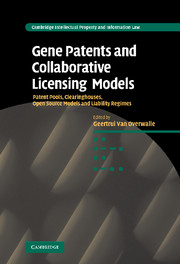 Gene Patents and Collaborative Licensing Models
Gene Patents and Collaborative Licensing Models from Part I - Patent pools
Published online by Cambridge University Press: 14 January 2010
Introduction
In the last ten years diverse entities have filed for patents in the field of genomics. The race for patenting DNA sequences started around 1980 growing steadily until reaching its peak by the late nineties. Nowadays, the race seems to have slowed down and the number of patents actually granted in the field of genomics is not significantly high in proportion to the number of applications. However, despite of the possibility that the patenting of DNA decreases due to the increase of patenting thresholds and, the fact that many patent applications are dropped as they prove to lack commercial viability (30% of US patents granted by the 1990s were abandoned by 2005), the amount of patents claiming DNA seems still relevant enough to raise concerns regarding access to the covered technology for further development.
The entities filing patents on DNA sequences range from big pharmaceutical companies to academic institutions. This diversity has resulted in IP fragmentation (one technology/many owners). This fragmentation has originated different concerns and controversy as to whether it represents a problem to R&D and how it may affect public health.
This paper briefly explains the effects of IP fragmentation. It continues with the presentation of patent pools as a solution to the negative effects of IP fragmentation. Finally, it discusses whether a patent pool represents an option for the SARS case.
To save this book to your Kindle, first ensure [email protected] is added to your Approved Personal Document E-mail List under your Personal Document Settings on the Manage Your Content and Devices page of your Amazon account. Then enter the ‘name’ part of your Kindle email address below. Find out more about saving to your Kindle.
Note you can select to save to either the @free.kindle.com or @kindle.com variations. ‘@free.kindle.com’ emails are free but can only be saved to your device when it is connected to wi-fi. ‘@kindle.com’ emails can be delivered even when you are not connected to wi-fi, but note that service fees apply.
Find out more about the Kindle Personal Document Service.
To save content items to your account, please confirm that you agree to abide by our usage policies. If this is the first time you use this feature, you will be asked to authorise Cambridge Core to connect with your account. Find out more about saving content to Dropbox.
To save content items to your account, please confirm that you agree to abide by our usage policies. If this is the first time you use this feature, you will be asked to authorise Cambridge Core to connect with your account. Find out more about saving content to Google Drive.